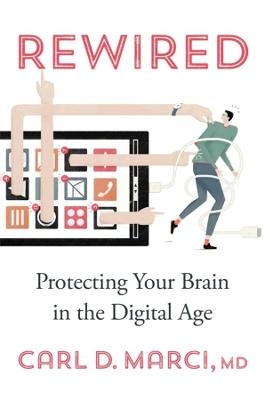
Rewired
Protecting Your Brain in the Digital Age
Seiten
2022
Harvard University Press (Verlag)
978-0-674-98366-3 (ISBN)
Harvard University Press (Verlag)
978-0-674-98366-3 (ISBN)
Social media and the always-connected digital life really are undermining our relationships. Carl Marci shows that our phone and Facebook habits aren’t just distractions; they’re altering our brains, harming our ability to communicate intimately. Fortunately, there are ways out. More than a critic, Marci offers solutions for tech-life balance.
Living in an age of digital distraction has wreaked havoc on our brains—but there’s much we can do to restore our tech–life balance.
We live in a world that is always on, where everyone is always connected. But we feel increasingly disconnected. Why? The answer lies in our brains. Carl D. Marci, MD, a leading expert on social and consumer neuroscience, reviews the mounting evidence that overuse of smart phones and social media is rewiring our brains, resulting in a losing deal: we are neglecting the relationships that sustain us and keep us healthy in favor of weaker and more ephemeral ties.
The ability to connect and form strong social bonds is fundamental to human experience and emerged through unique structures in our brains. But ever-more-powerful technologies and ubiquitous access to media have hijacked our need to connect intimately and emotionally with others. The quick highs of clicking “like” and swiping right overstimulate the same neurological reward centers associated with social relationships. The habits that accompany our digital lifestyles are putting tremendous pressure on critical components of the brain associated with attention, emotion, and memory, changing how we process information and altering how we communicate and relate, even at a physiological level.
As a psychiatrist working at the forefront of research on the impact of digital technology, Marci has seen this transformation up close and developed a range of responses. Rewired provides scientifically supported solutions for everyone who wants to restore their tech–life balance—from parents concerned about their children’s exposure to the internet to stressed workers dealing with the deluge of emails and managing the expectation of 24/7 availability.
Living in an age of digital distraction has wreaked havoc on our brains—but there’s much we can do to restore our tech–life balance.
We live in a world that is always on, where everyone is always connected. But we feel increasingly disconnected. Why? The answer lies in our brains. Carl D. Marci, MD, a leading expert on social and consumer neuroscience, reviews the mounting evidence that overuse of smart phones and social media is rewiring our brains, resulting in a losing deal: we are neglecting the relationships that sustain us and keep us healthy in favor of weaker and more ephemeral ties.
The ability to connect and form strong social bonds is fundamental to human experience and emerged through unique structures in our brains. But ever-more-powerful technologies and ubiquitous access to media have hijacked our need to connect intimately and emotionally with others. The quick highs of clicking “like” and swiping right overstimulate the same neurological reward centers associated with social relationships. The habits that accompany our digital lifestyles are putting tremendous pressure on critical components of the brain associated with attention, emotion, and memory, changing how we process information and altering how we communicate and relate, even at a physiological level.
As a psychiatrist working at the forefront of research on the impact of digital technology, Marci has seen this transformation up close and developed a range of responses. Rewired provides scientifically supported solutions for everyone who wants to restore their tech–life balance—from parents concerned about their children’s exposure to the internet to stressed workers dealing with the deluge of emails and managing the expectation of 24/7 availability.
Carl D. Marci, MD, a leader in the fields of social and consumer neuroscience, is Chief Medical Officer at Cava Capital and was formerly the Chief Neuroscientist at the Nielsen Company. He also is on the faculty of Harvard Medical School and is a psychiatrist at Massachusetts General Hospital.
| Erscheinungsdatum | 19.04.2022 |
|---|---|
| Verlagsort | Cambridge, Mass |
| Sprache | englisch |
| Maße | 156 x 235 mm |
| Gewicht | 544 g |
| Themenwelt | Sachbuch/Ratgeber ► Gesundheit / Leben / Psychologie ► Psychologie |
| Medizin / Pharmazie ► Medizinische Fachgebiete ► Neurologie | |
| Medizin / Pharmazie ► Medizinische Fachgebiete ► Psychiatrie / Psychotherapie | |
| Naturwissenschaften ► Biologie ► Humanbiologie | |
| Naturwissenschaften ► Biologie ► Zoologie | |
| ISBN-10 | 0-674-98366-1 / 0674983661 |
| ISBN-13 | 978-0-674-98366-3 / 9780674983663 |
| Zustand | Neuware |
| Informationen gemäß Produktsicherheitsverordnung (GPSR) | |
| Haben Sie eine Frage zum Produkt? |
Mehr entdecken
aus dem Bereich
aus dem Bereich
Buch | Softcover (2021)
Kohlhammer (Verlag)
29,00 €
mental gesund und stark in herausfordernden Zeiten
Buch | Hardcover (2024)
Droemer (Verlag)
20,00 €
der Leitfaden für die Praxis der Akzeptanz- und Commitment-Therapie
Buch (2023)
Arbor (Verlag)
42,00 €


